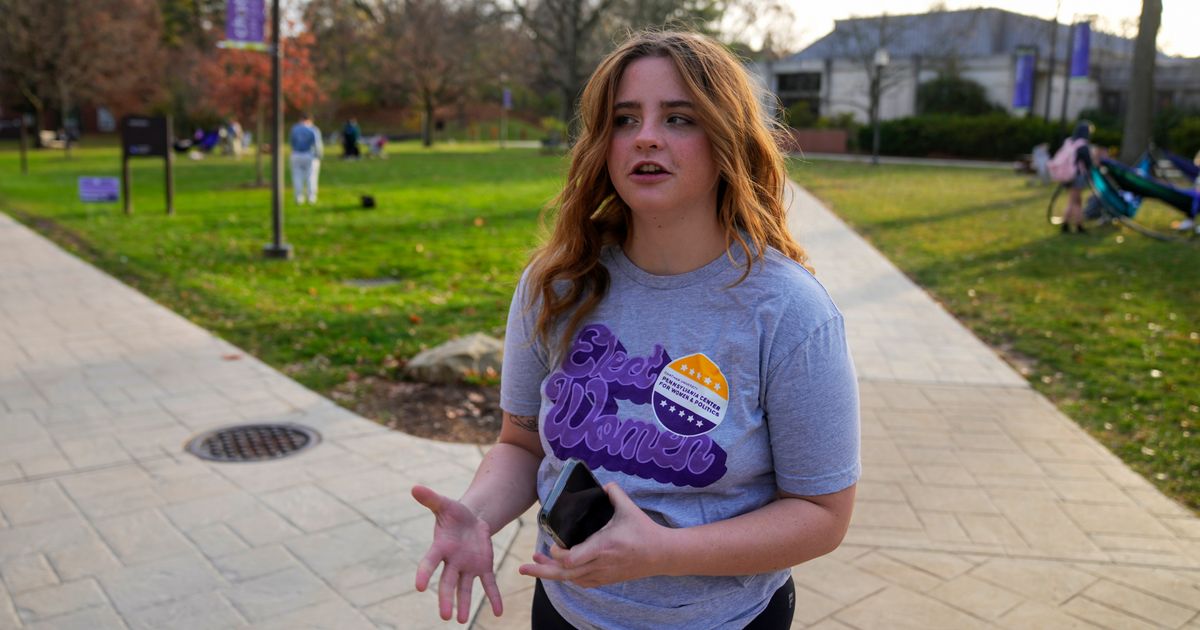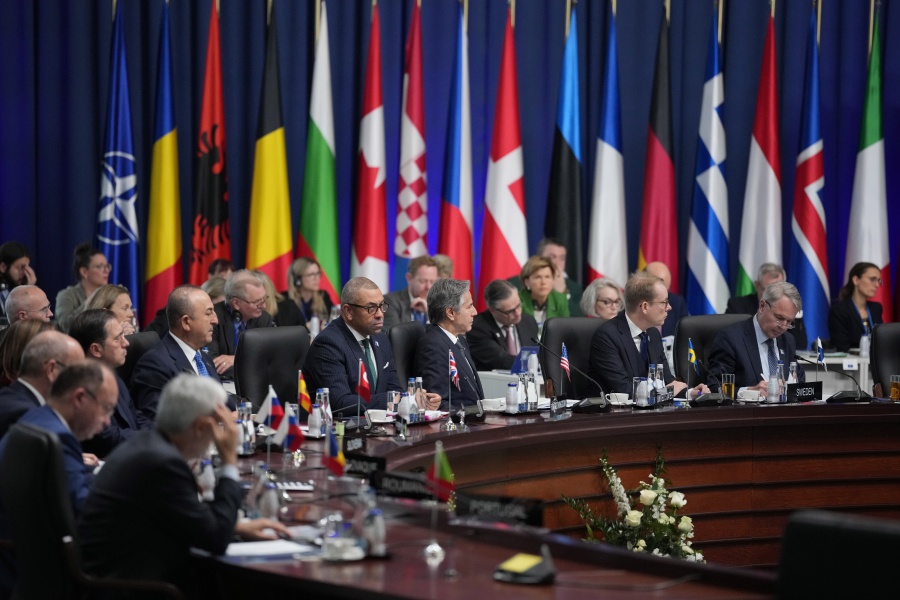WASHINGTON (AP) — Democracy is under attack in the United States, according to lifelong Philadelphia Democrat Mona Cohen. In the midterm elections, she cited a woman’s right to an abortion as one of the many fleeting freedoms she voted to protect.
Cohen, 68, feared that the Supreme Court’s decision in June to eliminate women’s constitutional protections against abortion was just the beginning of a broader erosion of rights. So she supported Democrats in her home state of Pennsylvania, where the party flipped a U.S. Senate seat and won the gubernatorial race against a pair of Donald Trump loyalists.
A Republican-dominated government, Cohen said, “would obstruct contraception, obstruct marriage equality, obstruct any civil rights that we as a society have fought for for the last 50 years.”
Support for abortion rights did drive women to the polls in Tuesday’s election. But for many, the question has taken on a higher meaning as part of an overarching concern about the future of democracy.
According to AP VoteCast, a nationwide survey of more than 94,000 midterm voters, women, especially Democratic women, were more likely than men to say that overturning Roe v. Wade was a major factor in their vote. More women also said de-choice made them angry and said abortion had a big impact on their decision to vote and which candidate they supported.
But the future of democracy was an even more important factor than Roe for women voters. In interviews with AP reporters, many women linked their anxiety about abortion to fear for the country.
“I’m not happy that we had this abortion drama, but I’m glad that it led to a new conversation about what democracy should be like in our country,” said Pennsylvania resident Brianna McCullough, 20, a sophomore. at Chatham University in Pittsburgh. “If they can take that, they can take anything from people. And I don’t think it’s right.”
Ahead of this week’s election, Republicans were expected to seize control of Congress. It’s still possible as several races are too close to call, but Democrats denied Republicans the sweeping national victory they were hoping for.
Abortion “may have made the difference in some key races where the election was really competitive,” said Ashley Kirzinger, director of polling methodology at KFF, which developed the questions and published the VoteCast analysis.
Many Democratic candidates campaigned for abortion rights. But they also see the “extreme” attitudes of their Republican rivals on abortion as an example of a broader threat to the country’s democratic institutions, including the electoral system.
In Pennsylvania and Wisconsin, Democrats who won tight gubernatorial races will appoint people to run statewide elections. In Michigan, Democrats won the gubernatorial and secretary of state races, defeating candidates who opposed abortion rights and denied the results of the 2020 election.
“Michigan is a good place to be right now,” said Ellie Mosko, 40, an attorney and mother of three in the Detroit area. Democrats also backed a successful ballot measure enshrining abortion rights in the state constitution. In addition, Democrats took control of the state Senate for the first time in 40 years.
“For me, the key issues are preserving democracy and voting rights,” Mosco said, “because without that, we can’t preserve women’s access to reproductive freedom.”
On Tuesday, voters in California and Vermont also decided to enshrine abortion protections in their state constitutions, while voters in Kentucky and Montana rejected anti-abortion amendments.
Republican candidates have gained ground in some states, including Ohio and Florida, potentially paving the way for more state bans on women’s access to abortion. But the GOP has lost contests elsewhere that would have made it easy for them to advance restrictions.
Among black and Hispanic women of various age groups, most of whom supported Democratic candidates, at least half said Roe had a big influence on their decision to vote. Democrats were also supported by white women under the age of 50, with about half saying it had a big impact on their decision to vote, compared with about a third of older white women.
Reproductive rights were a driving factor for Alison Brock McGill, 38, a black mother with a 2-year-old son. In 2020, she moved from New York to Atlanta, where a recent conversation reminded her that she is no longer in Brooklyn.
During her recent annual visit to the OB/GYN, the topic of having a second child was brought up. The doctor reminded her that in Georgia, a woman can now terminate a pregnancy up to about six weeks into her pregnancy. After that, the doctor had to refer her to a doctor in another state if she wanted an abortion.
Georgia’s new law, which bans most abortions after cardiac activity is detected, went into effect after the Supreme Court overturned Roe v. Wade.
“I was just blown away by it,” McGill said. “At six weeks, nobody knows anything.”
That’s the main reason she’s voted for Democratic candidates up and down, including Sen. Raphael Warnock, whose tight race for U.S. senator is heading to a runoff with his Republican challenger, former football star Herschel Walker.
Still, for many women, inflation in the country outweighs abortion. About two-thirds of Republican women said inflation was their top concern, compared with about a third of Democratic women.
“A woman might need an abortion once or twice in her life, but I have to feed these babies every day,” said Kelly Morris, 60, a registered Republican in Dayton, Ohio, and mother of nine.
In Ohio, Trump-endorsed J.D. Vance won an open U.S. Senate seat and the GOP swept statewide offices. A ban on abortion after six weeks of pregnancy is currently blocked by a lower court in Ohio, but is currently on appeal. Three conservative wins on the Ohio Supreme Court, as well as the impending appointment of Republican Gov. Mike DeWine, mean the ban is likely to be heard in a court with a 4-3 GOP majority.
Still, for abortion-rights opponent Elizabeth Lamora of suburban Cincinnati, the election wasn’t all about that. She took issue with inflation, border security and “the whole LGBT alphabet issue” — notably opposing transgender youth rights.
Said Lamoreaux, “I feel like our country as a whole right now is kind of a dumpster fire.”
___
AP VoteCast is a survey of the American electorate conducted by NORC at the University of Chicago for Fox News and The Associated Press. The survey of 94,296 voters was conducted over nine days, ending with the closing of polling stations. Interviews were conducted in English and Spanish. The survey draws together a random sample of registered voters drawn from state voter files; self-identification of registered voters using the AmeriSpeak panel, based on NORC’s probability, which is intended to be representative of the US population; and self-identified registered voters selected from non-probability online panels. Sampling error for voters is estimated to be plus or minus 0.5 percentage points. Read more at https://ap.org/votecast.
___
Brooke Schultz contributed from Harrisburg, Pennsylvania, and Hannah Fingerhut from Washington. Hecker reported from San Francisco.
Schultz is a member of the Associated Press Corporation/Report for America Statehouse News Initiative. Reporting for America is a national nonprofit that places journalists in local newsrooms to cover underreported issues.







